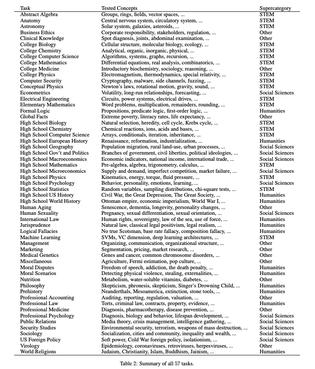Multi-task Language Understanding
32 papers with code • 4 benchmarks • 5 datasets
The test covers 57 tasks including elementary mathematics, US history, computer science, law, and more. https://arxiv.org/pdf/2009.03300.pdf
Libraries
Use these libraries to find Multi-task Language Understanding models and implementationsMost implemented papers
RoBERTa: A Robustly Optimized BERT Pretraining Approach
Language model pretraining has led to significant performance gains but careful comparison between different approaches is challenging.
Language Models are Few-Shot Learners
By contrast, humans can generally perform a new language task from only a few examples or from simple instructions - something which current NLP systems still largely struggle to do.
ALBERT: A Lite BERT for Self-supervised Learning of Language Representations
Increasing model size when pretraining natural language representations often results in improved performance on downstream tasks.
LLaMA: Open and Efficient Foundation Language Models
We introduce LLaMA, a collection of foundation language models ranging from 7B to 65B parameters.
Language Models are Unsupervised Multitask Learners
Natural language processing tasks, such as question answering, machine translation, reading comprehension, and summarization, are typically approached with supervised learning on taskspecific datasets.
Llama 2: Open Foundation and Fine-Tuned Chat Models
In this work, we develop and release Llama 2, a collection of pretrained and fine-tuned large language models (LLMs) ranging in scale from 7 billion to 70 billion parameters.
Evaluating Large Language Models Trained on Code
We introduce Codex, a GPT language model fine-tuned on publicly available code from GitHub, and study its Python code-writing capabilities.
Measuring Massive Multitask Language Understanding
By comprehensively evaluating the breadth and depth of a model's academic and professional understanding, our test can be used to analyze models across many tasks and to identify important shortcomings.
GLM-130B: An Open Bilingual Pre-trained Model
We introduce GLM-130B, a bilingual (English and Chinese) pre-trained language model with 130 billion parameters.
GPT-4 Technical Report
We report the development of GPT-4, a large-scale, multimodal model which can accept image and text inputs and produce text outputs.





 MMLU
MMLU
 BIG-bench
BIG-bench
 BBH
BBH
